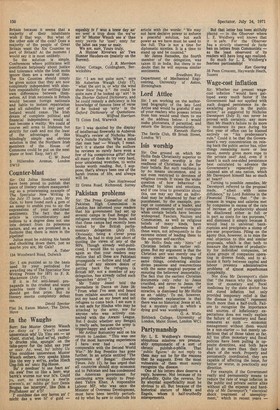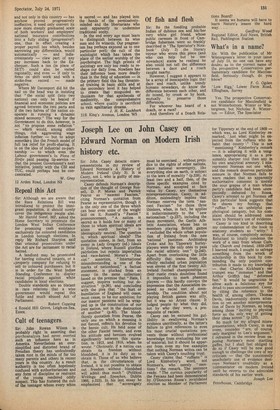Wage-cost inflation
Sir: Whether our present wagecost inflation "would have galloped away much faster if the Government had not applied with such dogged persistence its deescalating policy in the public sector," as suggested by Nicholas Davenport (July 3), can never be proved with certainty, any more than Mr Heath's failure to do more to moderate its pace during his first year of office can be blamed entirely on "his predecessor's rule." Could it be that the Government's very concentration on reining back the public sector has, other things remaining more or less equal, merely given more rope to the private one? And, even if it hasn't is such one-sided persistence best calculated to advance the Government's repeatedly proclaimed aim of one nation, which Mr Davenport himself has so much at heart?
Turning to possible remedies, Mr Davenport referred to the proposal made, "albeit with some diffidence," by Lord Robbins in the Financial Times, that "the increases in wages and salaries met by companies in excess of the rate of increase of productivity should be disallowed either in full or in part as costs for tax purposes," and dismissed it simply because it would lead to universal bankruptcies and precipitate a slump of pre-war proportions. Piling on the agony thus, however, is to miss the real objection to this and similar proposals, which is that both to measure the increase of productivity for individual companies, let alone groups of companies operating in diverse fields, and to allocate it fairly between capital and labour presents administrative problems of almost superhuman complexity.
Nor does Mr Davenport's claim that "the reason why the application of monetary and fiscal medicines by the state doctor has not cured inflation but only provided temporary relief is that the disease is mental" represent much more than a half-truth. Failure to recognise the importance and sources of inflationary expectations does not really explain the failure of monetary and fiscal measures as such •— economic management without them would be a non-starter — but merely underlines that of those taken so far. All too often monetary and fiscal policies have been pulling in opposite directions, and both have had to do more than their fair share of the work. Properly and persistently coordinated, they are capable of affecting the issue, for better or worse, in practically any direction.
For example, if the Government really and permanently means to reduce the rate of wage inflation in the public and private sector alike without all the expense and hardship of Mr Davenport's, "electrical shock treatment of unemployment," which in recent years —
and not only in this country — has anyhow proved progressively ineffective, it need only convert its now more steeply graduated scale of both workers and employers' national insurance contributions into a fully sliding (progressive?) one, thus in effect creating a proper payroll tax which, besides narrowing pay differentials, would automatically — and indiscriminately — claw part of any pay increases back to the Exchequer. Such a tax (in place of SET?) could also be varied regionally, and even — if only to firms on shift work and with a strike-free record — made negative.
Where Mr Davenport did hit the nail on the head was in insisting that " the social split (into two nations) can only be healed if financial and economic policies are agreed between the two parts and if the two halves of the nation cooperate in running a dynamic mixed economy." The way for the Government to do this, however, is not "to propose some reflation" — which would, among other things, risk aggravating wage inflation further — but to adopt somethir g like the French model of full tax elief for profit-sharing. It is on the idea of industrial co-partnership — to which even the Labour government's In Place of Strife paid passing lip-service — that the present Government's next initiative, jointly with the CBI and TUC, could perhaps best be concentrated.
W. Grey 12 Arden Road, London N3











































 Previous page
Previous page